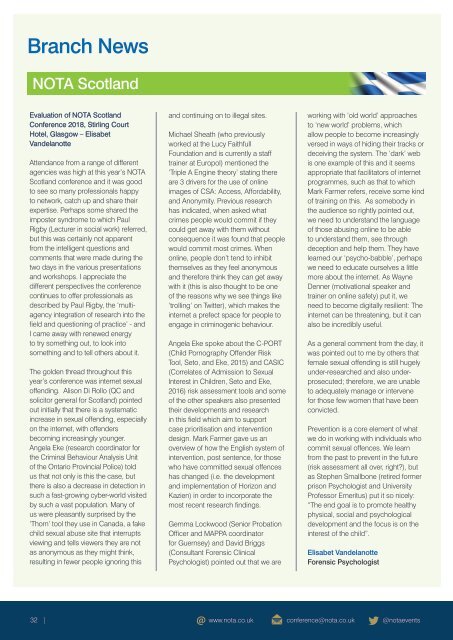NOTA News Newsletter July 2018 1
Create successful ePaper yourself
Turn your PDF publications into a flip-book with our unique Google optimized e-Paper software.
Branch <strong>News</strong><br />
<strong>NOTA</strong> Scotland<br />
Evaluation of <strong>NOTA</strong> Scotland<br />
Conference <strong>2018</strong>, Stirling Court<br />
Hotel, Glasgow – Elisabet<br />
Vandelanotte<br />
Attendance from a range of different<br />
agencies was high at this year’s <strong>NOTA</strong><br />
Scotland conference and it was good<br />
to see so many professionals happy<br />
to network, catch up and share their<br />
expertise. Perhaps some shared the<br />
imposter syndrome to which Paul<br />
Rigby (Lecturer in social work) referred,<br />
but this was certainly not apparent<br />
from the intelligent questions and<br />
comments that were made during the<br />
two days in the various presentations<br />
and workshops. I appreciate the<br />
different perspectives the conference<br />
continues to offer professionals as<br />
described by Paul Rigby, the ‘multiagency<br />
integration of research into the<br />
field and questioning of practice’ - and<br />
I came away with renewed energy<br />
to try something out, to look into<br />
something and to tell others about it.<br />
The golden thread throughout this<br />
year’s conference was internet sexual<br />
offending. Alison Di Rollo (QC and<br />
solicitor general for Scotland) pointed<br />
out initially that there is a systematic<br />
increase in sexual offending, especially<br />
on the internet, with offenders<br />
becoming increasingly younger.<br />
Angela Eke (research coordinator for<br />
the Criminal Behaviour Analysis Unit<br />
of the Ontario Provincial Police) told<br />
us that not only is this the case, but<br />
there is also a decrease in detection in<br />
such a fast-growing cyber-world visited<br />
by such a vast population. Many of<br />
us were pleasantly surprised by the<br />
‘Thorn’ tool they use in Canada, a fake<br />
child sexual abuse site that interrupts<br />
viewing and tells viewers they are not<br />
as anonymous as they might think,<br />
resulting in fewer people ignoring this<br />
and continuing on to illegal sites.<br />
Michael Sheath (who previously<br />
worked at the Lucy Faithfull<br />
Foundation and is currently a staff<br />
trainer at Europol) mentioned the<br />
’Triple A Engine theory’ stating there<br />
are 3 drivers for the use of online<br />
images of CSA: Access, Affordability,<br />
and Anonymity. Previous research<br />
has indicated, when asked what<br />
crimes people would commit if they<br />
could get away with them without<br />
consequence it was found that people<br />
would commit most crimes. When<br />
online, people don’t tend to inhibit<br />
themselves as they feel anonymous<br />
and therefore think they can get away<br />
with it (this is also thought to be one<br />
of the reasons why we see things like<br />
‘trolling’ on Twitter), which makes the<br />
internet a prefect space for people to<br />
engage in criminogenic behaviour.<br />
Angela Eke spoke about the C-PORT<br />
(Child Pornography Offender Risk<br />
Tool, Seto, and Eke, 2015) and CASIC<br />
(Correlates of Admission to Sexual<br />
Interest in Children, Seto and Eke,<br />
2016) risk assessment tools and some<br />
of the other speakers also presented<br />
their developments and research<br />
in this field which aim to support<br />
case prioritisation and intervention<br />
design. Mark Farmer gave us an<br />
overview of how the English system of<br />
intervention, post sentence, for those<br />
who have committed sexual offences<br />
has changed (i.e. the development<br />
and implementation of Horizon and<br />
Kazien) in order to incorporate the<br />
most recent research findings.<br />
Gemma Lockwood (Senior Probation<br />
Officer and MAPPA coordinator<br />
for Guernsey) and David Briggs<br />
(Consultant Forensic Clinical<br />
Psychologist) pointed out that we are<br />
working with ‘old world’ approaches<br />
to ‘new world’ problems, which<br />
allow people to become increasingly<br />
versed in ways of hiding their tracks or<br />
deceiving the system. The ‘dark’ web<br />
is one example of this and it seems<br />
appropriate that facilitators of internet<br />
programmes, such as that to which<br />
Mark Farmer refers, receive some kind<br />
of training on this. As somebody in<br />
the audience so rightly pointed out,<br />
we need to understand the language<br />
of those abusing online to be able<br />
to understand them, see through<br />
deception and help them. They have<br />
learned our ‘psycho-babble’, perhaps<br />
we need to educate ourselves a little<br />
more about the internet. As Wayne<br />
Denner (motivational speaker and<br />
trainer on online safety) put it, we<br />
need to become digitally resilient: The<br />
internet can be threatening, but it can<br />
also be incredibly useful.<br />
As a general comment from the day, it<br />
was pointed out to me by others that<br />
female sexual offending is still hugely<br />
under-researched and also underprosecuted;<br />
therefore, we are unable<br />
to adequately manage or intervene<br />
for those few women that have been<br />
convicted.<br />
Prevention is a core element of what<br />
we do in working with individuals who<br />
commit sexual offences. We learn<br />
from the past to prevent in the future<br />
(risk assessment all over, right?), but<br />
as Stephen Smallbone (retired former<br />
prison Psychologist and University<br />
Professor Emeritus) put it so nicely:<br />
“The end goal is to promote healthy<br />
physical, social and psychological<br />
development and the focus is on the<br />
interest of the child”.<br />
Elisabet Vandelanotte<br />
Forensic Psychologist<br />
32 | www.nota.co.uk conference@nota.co.uk @notaevents





